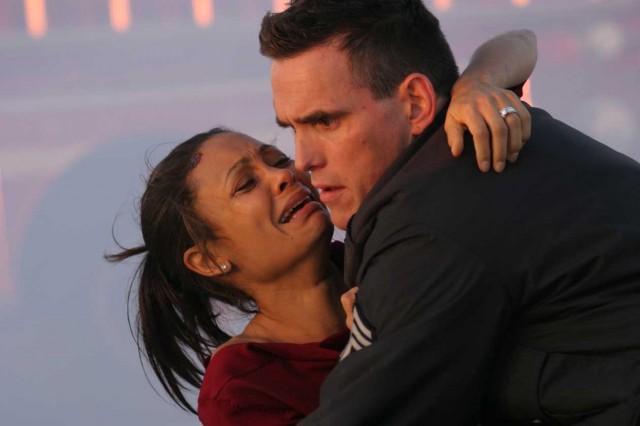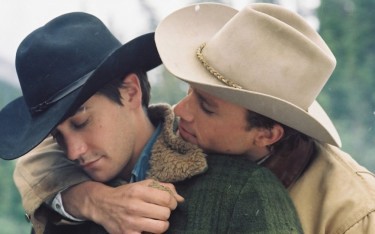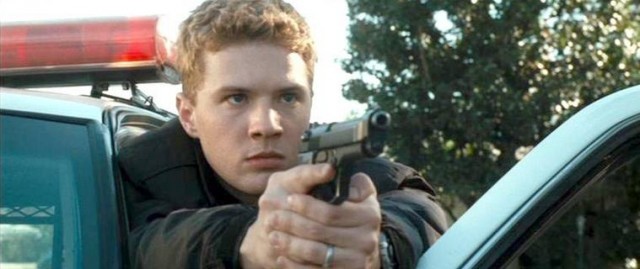'Crash': The Most Loathsome Best Picture Of Them All
‘Crash’: The Most Loathsome Best Picture Of Them All
by Mallory Ortberg and Anne Helen Petersen

Mallory: Has Crash suffered enough? Sure, it won homecoming queen at the Oscars, but then no one would let Crash sit with them at lunch for the next eight years. Ta-Nehisi Coates named it the worst movie of the decade; Natasha Vargas-Cooper referred to it as a “white guilt manipulation-a-thon.” Even Slate wouldn’t throw it a contrarian bone. It’s The Most Popular Girl That Nobody Liked.
Anne Helen: No, it has not. This movie needs to keep suffering, because it will not stop hurting us. When it came up on Twitter the other night, someone suggested it’s a PowerPoint presentation posturing as insight — and that feels true. It has the selfsame didacticism and banality of a white slide, Arial Font: RACISM IS BAD.
As the Oscars draw near, the next in a series about our strong movie opinions, past and present.
Mallory: Let us go back to 2005 and the year it won.
Anne Helen: This film was a bit of an indie-darling-that-could. Paul Haggis was hot stuff after writing Million Dollar Baby, which won Best Picture in 2004. Three months later, Crash hit theaters like the tsunami that hit all those nice white families on vacation in The Impossible. Critics kinda sorta liked it, the way critics kinda sorta do — it’s the kind of film that curdles with time, so the real pushback didn’t come until months later when a slew of nominations made it clear that people were taking this film, and its notions of race, seriously. And then it won Best Picture and Jesus wept.
Mallory: You are both correct and beautiful, Anne. This is the one that still stings. Every year we moan in chorus that the Oscars are terrible, that they reward cheap spectacle and sentiment over all else, that the idea that you can pick one movie out of an entire calendar year and call it the best in the first place is stupid and exhausting, something something How Green Was My Valley, but this was the most unkindest cut of all.
Anne Helen: We must wage a constant battle against the sort of toxic, seeping, ideological diarrhea that is Crash.
Mallory: The anti-Crash barricades must never be allowed to fall. According to Chuck Klosterman, it is wrongheaded and foolish to ever feel betrayed by popular culture. Yet I would argue that one can plot a straight line from Crash’s Best Picture win to Californians passing a proposition banning gay marriage and a proposition making chickens being raised for slaughter more comfortable in the same year and congratulating themselves for doing so. Crash is the version of Cinderella where one of the ugly stepsisters successfully manages to slice off her toes and force her feet into the glass slippers; she strong-arms the prince into marrying her out of embarrassment and together they run the kingdom’s economy into the ground, while Cinderella marries some cook’s assistant and dies of TB before having any children.
Anne, shall we anticipate the cries of exhausted naysayers who think getting upset about the Oscars is a pointless exercise in trumped-up outrage?
Anne Helen: Yes, let’s.
Mallory: Be warned, naysayers: we anticipate you. Of course Best Picture goes most often to forgettable middlebrow nonsense, but even those who slumber may occasionally be permitted to roll over in bed.
Anne Helen: It’s a neoliberal shitshow. Its moral being: if individuals stop being racist or, more specifically, stop committing egregiously racist acts, like acts that even your five-year-old cousin can identify as racist, then VOILA, racism is gone. And then there’s certainly no need for systemic change, or consideration of how systemic inequity has perpetuated racism between individuals.
Mallory: Right! It’s “being racist” versus “doing something racist.” Jay Smooth did a better job explaining this in three minutes than Crash did in however long Crash was. Crash is your friend’s grandmother whose family is really proud that she doesn’t say “colored” anymore. I mean, it is great that she doesn’t say “colored” anymore; I don’t want to take away from that. She’s 83 years old and grew up in Georgia. That’s not nothing. But it also very much isn’t everything.
Anne Helen: If you need to understand that all people are racist towards all sorts of other people, just watch Do the Right Thing. On repeat, forever.
Mallory: Or season 1 of “Oz.” But certainly don’t watch anything where the writer rubbed his hands together and whispered “this is gonna blow their minds” after hacking his way through the last page.
Anne Helen: If Crash were just an annoyingly tone-deaf picture that won Sandra Bullock an award for Best Actress, I’d probably feel less harsh towards it. But Crash beat Brokeback Mountain for Best Picture, which, even now stands as a monstrous miscarriage of justice.
Mallory: Oh, Brokeback Mountain. People were so uncomfortable with that movie when it first came out. And, granted, it could have used a Sodomy Consultant for that tent scene. But it actually holds up quite well, inasmuch as it still holds the power to reduce me to a sentient, sobbing sore throat as of about a week ago.

Anne Helen: I can’t forgive the Academy for seeing a movie about people living in Los Angeles, identifying, and voting with their “hey look, we’re assholes, but curable assholes!” guilt — over a film of uncurable beauty. Brokeback Mountain is the anti-Crash. It tells us all that we are the assholes who perpetuate homophobia, who keep the jean jacket in the closet. My uncontrollable weeping at the end of that film was as much for Ennis as it was for our sad, scared selves.
Mallory: Here we part ways. Brokeback Mountain is not a movie about homophobia in the same way that Crash is about racism. It is about someone who has the misfortune of falling in love with someone incapable of change, and also about how hot it is to make out with someone that you are not supposed to be making out with.
Anne Helen: I heed your point, Mallory, and expand it: someone somewhere said that the more highly specific the situation, the more universal. So even though Brokeback is a highly specific story about man-love in a particular time and place, its resonance is universal in a way that Crash, with its billion-plot-lines-all-intersecting, HEY DID YOU KNOW WE’RE ALL HUMAN can never be.
Mallory: Oh my God, can you even imagine the Crash-y version of Brokeback Mountain?
JACK: I wish I knew how to quit you because socially, that would make my life easier. Yet I also regularly engage in unprotected anal sex, as is my right. Does this make you uncomfortable?
BROKEBACK MOUNTAIN: You people disgust me.
ENNIS: I hate Mexicans, but a Mexican woman saved my life. What am I supposed to do with this?
The MOUNTAIN crashes into everybody. They die. The MEXICAN WOMAN names her daughter Ennis, who grows up to be Hillary Clinton because anything is possible.
Mallory: But enough of Brokeback Mountain’s virtues. It is a good and a fine movie and well worth watching, but that is not the task at hand. Let us list the reasons Crash’s victory demeans us all.

Anne Helen: The music during the car crash scene is just horrible. The music during all the scenes is horrible. Ryan Phillippe is horrible, Thandie Newton is horrible, Terrence Howard’s mock turtleneck is horrible, all these people are horrible. But redeemed through a moment of dramatic self-realization! If only Farhad had listened to what the locksmith was trying to tell him without being blinded by prejudice… but then, do any of us ever really listen? There are more cultural epiphanies in this movie than a “Sex and the City” voiceover. Crash is basically why Brecht starting being Brechtian.
Mallory: Also: every single one of the movie posters shows at least one of the characters howling in primal agony.
Anne Helen: Also Brendan Frasier being bloated.
Mallory: Here again we part ways. Brendan Frasier is above reproach, and I will not join you in your bloat-shaming.
Anne Helen: Also a curse on both your Scientology houses, Paul Haggis, for ruining “Adagio for Strings.”
Mallory: You can’t pin that on Haggis. That was ruined years before.
Anne Helen: Crash is one of those movies that when someone says it’s one of their favorites, I have no choice but to dislike them. Guaranteed antipathy for the rest of our lives. Fuck being such an overdetermined signifier of worthlessness.
Mallory: Liking Crash is a symptom of the worst kind of moral and cultural laziness. I feel free to make the wildest assumptions about Crash enthusiasts: they probably also enjoy Dave Matthews’ “Crash” and making Guy Fieri jokes. They pronounce it “cue-pon,” not “coo-pon.” They eat at the kind of restaurant where the provenance of each ingredient is carefully listed but the servers and bussers don’t get health insurance. They buy scented candles and the wrong kind of disposable napkins. Crash fans also wade into the comments of news articles to take issue with referring to George Zimmerman as a murderer because “we don’t have all the facts yet” and pride themselves on their objectivity. Related: I am a monster.
Anne Helen: Can we talk about how for many years the movie was perpetually #1 on Netflix’s most-rented list? That fucking kills me. Why do people rent this movie? Do they rent it and realize that they never want to watch it because it’s so self-congratulatory and head-thumpingly moralistic and thus never send it back? Or, WORST NIGHTMARE, do they rent it, watch it while sharing a bottle of Chardonnay, turn it off, and talk about how awful those things were but thank god we don’t live in a place where racism is actually a problem?
Mallory: I do worry about this! I worry about these people very much (you’re welcome, people. I am looking out for you).
Anne Helen: Crash pushes the sort of middlebrow pseudo-intellectualism that I have zero problem decrying. I’m not a total asshole; I’m constantly interrogating the conflation of taste and class. But as you say above, admiring Crash is lazy. Thinking it’s deep is lazy.
Mallory: Also this movie has the worst and weirdest moral equations going on, like Q: If someone who sexually assaulted you later saves your life, is he still racist? A: My daughter is dead.
Anne Helen: Watch Queen of Versailles and think about whiteness and class, people! That’s an indictment that will make you uncomfortable, which is what a movie about race and class should do.
Mallory: Crash winning was Achilles fighting Hector and losing. It was Harry Potter losing to Twlight (I actually do not hate Twilight and think Harry Potter got mega-ultra-boring by the end, but I know which world it is better to live in, especially if you know that you would be a supporting character). Crash is why we got The Blind Side. Sandra Bullock, there is much for which you will be asked to atone in the next life, even if you do have great hair and the kind of soporific smile that makes me feel like everything is going to be okay and your face looks like a friendly sun.
Anne Helen: TRUTH, MALLORY, TRUTH. Because even when people stop renting Crash on Netflix, its legacy is still with us. It’s in The Blind Side, but it’s also very much in The Help. I’m actually surprised there isn’t a single “white people solve racism” film in this year’s Oscar bunch — it’s so incessant, so culturally assertive, so eager to be green-lighted by all manner of white execs who want to show that they’re willing to cast black actors so long as their salvation is rooted in the extravagances of white privilege. Crash hurts my soul — but it’s also an incredible teaching tool. When I’m talking about the mid-2000s in class, twenty years from now, I’ll be able to point to it as a perfect crystallization of all America wishes it was and all it was not. That’s a fucking tragedy, but that doesn’t mean I’m not glad this film exists.Traces matter, however repugnant.
Mallory: I think it’s wonderful that you think there will still be human teachers in American universities twenty years from now.
Previously in series: ‘The Best Exotic Marigold Hotel’ Is My Favorite Movie Of 2012
Mallory Ortberg is a writer in the Bay Area. Her work has also appeared on The Hairpin, Slacktory and Ecosalon. Anne Helen Petersen writes Scandals of Classic Hollywood.
